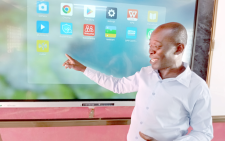Digital gender divide clicks girls off online opportunities

There is little research on gender differences in digital access for children under the age of 18; however, the limited data indicates girls aged 15-19 years old access and use the internet less likely than boys.
This was revealed in a United Nations Children’s Fund report, What we know about the gender digital divide for girls: A literature review.
The report, published in June this year, also reveals that a number of studies show boys are 1.5 times more likely to own a mobile phone and 1.8 time more likely to own a smartphone than girls.
On the other hand, 52 per cent of girls are more likely to borrow a phone to have digital access compared to 28 per cent of boys.
Consequently, girls are not able to equally participate in digital societies, and thus are held back from taking part in campaigning for issues that affect them.
When girls and women are not involved in creating digital tools and online content, it may further exacerbate the existing inequalities.
Worse for rural girls
It is such digital divides that drove Ruth Kaveke, to co-found the Pwani Teknowgalz, a non-profit organisation in Mombasa that has so far reached over 5,000 girls and young women in Mombasa and the country through the various programmes.
Ruth observes that this digital divide when it comes to adoption and use of technology is particularly wider in the rural areas.
“The gaps exist because of lack of awareness and training. Some girls face culture challenges that do not empower them to adopt and use technology.
For instance, a community can always tell girls that technology is a male thing or at young age girls get dolls while boys get electronic items that assist them to love technology.
As parents or community, we might be doing this without knowledge of its impact. More training and awareness needs to be created for them,” she explains.
As the world celebrated this year’s International Day of the Girl Child with the theme, Digital generation.
Our generation, the need for digital inclusion for girls especially since Covid-19 pandemic has speeded up use of digital platforms for education, connection and income generation.

Linda Nakhulo Ochwada, founder and managing director at AfroAI, a consulting company that looks into leveraging Artificial Intelligence and geospatial science in problems that face Africa, began mentoring and e-counselling young girls in rural Kenya, Nigeria and Ghana to help them transition to tech.
“I want to make them understand that tech is and will be the future. There is a significant gender gap in the technology world.
A lack of female role models pushes women to believe a career in tech isn’t for them.
This encourages and pushes me into being both a role model and a mentor to girls to be part of women in Tech,” says Linda.
Some of the challenges that she faces include expensive mobile calls to her mentees and poor internet connection that affects communication.
“Some of my mentees are from a poor background, and talking to them is only through their parent›s mobile phones.
I have to put a lot of consideration with scheduling meetings to fit their lives in Africa and mine in Germany, including the time differences.
It is also time-consuming and needs more energy commitment, and sometimes you get unexpected expectations. For example, one of the girls I mentor through high school, couldn’t join University due to lack of fees,” explains Linda.
Emily Mimi Mogeni, an IT Solutions Specialist in the US and the co-founder and Chief Tech Officer of Smatbeba, a Kenyan logistics start-up that links cargo owners with delivery drivers believes that mentorship is what is needed to bridge this divide.
“Encourage more girls to pursue STEM courses and provide a path to job placements in and outside Kenya.
Introduce technology in primary school and encourage young children to pursue their passion instead of what we are told to do. Allow early adoption to talent, grow and encourage talent.
Cut down on high taxes and make Kenya an investor friendly country. Encourage tech giants to open locations in Kenya and cut down on taxes and tariffs,” she recommends.
Lorraine Onduru – Head of Communications, East and West Africa at Uber calls for recognition the challenges girls and women face.
“Corporates and individuals need to place greater attention on women’s rights and gender equality to mobilise all people to do their part to emancipate women in society.
It is important that we do these as an ongoing effort, and ensuring company policies are focused on diversity and inclusion,” she says.












